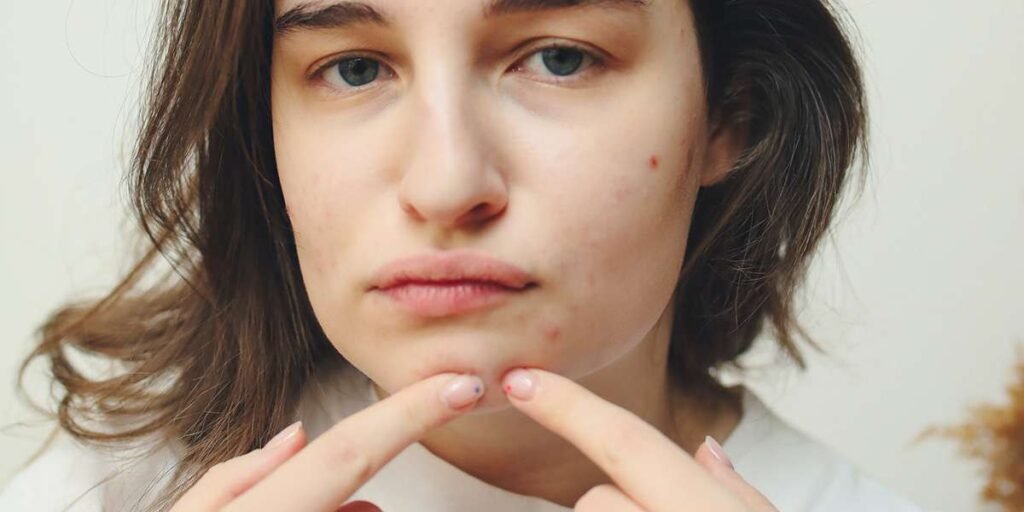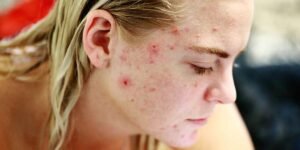
Non-stop Acne? Nine Causes of Pimple All Over the Face
In a person’s life, there will be acne vulgaris on the face. Some people have pimples, redness, swelling, and serious ulcers. That is because pimples are a type of acne. Some people are naturally beautiful and almost never have acne. This is because several key factors are involved, and we will introduce you to 9 factors that cause acne.
9 Reasons Why Pimples Keep Popping Up
1. Hormone changes
Hormonal changes in the human body are the most common cause of acne. Although hormonal changes occur in adolescence, they can also occur in adulthood.
2.During puberty
Androgen is a sex hormone that increases during puberty and stimulates the oil glands in the skin to produce more oil. The right amount of natural oils are the skin’s protective layer, and will also help keep the skin moisturized. However, excessive oil secretion will block the pores together with the dead skin cells after metabolism, causing the hair follicles to become inflamed and form pimples, commonly known as acne.
3. Adulthood
Your hormones change with your menstrual cycle, pregnancy, or certain hormonal treatments. Pimples can appear a few days before your menstrual cycle and disappear after the menstrual cycle is over. And some women develop pimples after they stop taking the pill.
4. Drug side effects
Taking certain medicines can give you acne. For example, drugs to treat epilepsy, depression, or corticosteroids, and some barbiturates or drugs containing lithium salts, the side effects of these drugs can cause you pimples
5. Family inheritance
Family inheritance is also an important factor. Because, if your parents have acne, you will also have the same genetics.
6. Cosmetics or irritating substances
Using makeup such as oil-based creams, lotions, or foundations that are not suitable for your skin type can cause your oils to potentially clog hair follicles and trigger breakouts. Inappropriate hair care products can also give bacteria in your hair the chance to migrate to your skin, causing pimples to develop on your scalp.
7. Stress
Some studies have confirmed that stress can cause acne to grow, and the condition can even be more serious than acne caused by hormones.
8. Environment
If you work in a chemical factory or in a greasy kitchen, you may be prone to acne. And the weather is hot, humid or too dry, which is also one of the triggers of your acne.
9. Pressure or friction on the skin
Tops, underwear straps, helmets, or shoulder pads can cause your skin to develop pimples from friction. The skin on the cheeks and shoulders that pinch the violin can also be injured by friction when playing the violin.
Six methods of acne care
In addition to the causes of pimples, we will also introduce you of how to take care of pimples at home, so that you can fight acne without worry!
1.Pay attention to diet
avoid chocolate, fried food, spicy food, dairy products, etc. Some diets vary from person to person.
2.Adequate sleep
Insufficient sleep will make acne worse. It is recommended to have enough energy and maintain a regular sleep schedule.
3. Clean the face
Wash the face regularly every day to remove sebum and dust. Use warm water and neutral soap that does not irritate the skin to effectively care for the skin.

4.Do not squeeze
Do not touch or squeeze the pimple with your hands, so as not to cause infection or acne scars.
5 Reduce make-up
Make-up can cause acne to be airtight, so you should remove make-up thoroughly and clean your face when you get home.
6.Ask your physician
For acne treatment, see a dermatologist and follow the regular doses as directed.
Related Topics
10 Antioxidant Foods Popular in Japan
Selenium – The Nutritional Key to Skin Health
How to deal with acne? 4 tricks to fight acne
Reference
Helpful Organization
Holland & Barrett Selenium + Zinc & Vitamins A, C & E – Hair, Nails & Immune System Support – 120 Tablets
- Full of Vitamins and Minerals: These coated tablets contains vitamins such as A, B6, C and E along with zinc and selenium minerals
- Antioxidant Supplement: Nutrients such as Vitamins C, E and Selenium play a role in protecting DNA, proteins and lipids from oxidative damage
- For your Skin, Hair & Nails: Zinc supports the normal function of the immune system, maintains normal skin, hair and nails, and contributes to macronutrients metabolism
- Our Promise to You: Holland & Barrett products are subject to critically stringent quality assurance. Our commitment to quality is the highest in our industry to ensure the best quality nutritional supplements money can buy. You have our guarantee!
- Directions: Take 1 Tablet(s) per day, preferably with a meal. Do not exceed the stated dose. Suitable for vegans and vegetarians
Holland & Barrett Selenium + Zinc & Vitamins A, C & E
Beauty From Within
How can zinc help improve acne?
Essential, zinc has long been recommended to help with acne prone skin. It plays a key part in the immune system and has qualities such as helping with enzymes, cell division and healing. It is often prescribed during pregnancy too, to help growth and development.
How can selenium help improve acne?
Selenium is the supplement many swear by.
It’s involved in fighting infection, and hormone balance. It works best in conjunction with zinc and vitamin E. When treating acne, it’s main role is as an anti-inflammatory.
How can Vitamin E help improve acne?
Known as the ‘healing’ vitamin, vitamin E is an anti-inflammatory antioxidant. It encourages healing, and is specifically renowned helping with acne scarring. You’ll find vitamin E in nuts, avocado and spinach.
How can Vitamin A help improve acne?
The great thing about vitamin A is that it contains retinol and pro-vitamin A carotenoids which help withgrowth, development and the immune system and most importantly, with skin cell regeneration. A big plus when fighting acne!
How can Vitamin C help improve acne?
Also known as L-ascorbic acid, vitamin C is a regular favourite and for good reason: this antioxidant fights free radical damage and helps with collagen renewal. It’s key to healthier, bouncier looking skin!
Holland & Barrett International is one of the world’s leading health and wellness retailers and the largest in Europe
Best Books to Treat Acne – Just Click to Buy
Selenium is a trace mineral needed in a variety ways to preserve health. Though its deficiency is uncommon a lack of selenium can cause a variety of problems such as exhaustion and muscle weakness. In this fact filled report, find out where selenium is ingested and also how selenium may be used in the the treatment of some common as well as severe health issues.
Acne, rosacea, and sebaceous hyperplasia are very common skin problems, which have a significant medical, cosmetic, and often psychological impact on the daily lives of millions of people. This book covers both the medical and cosmetic aspects of these skin disorders including all clinical considerations, etiology, epidemiology, diagnostic challenges, and the latest theories on
Have you tried and failed with conventional Western medications to cure acne? Are you looking for proven ways to naturally get rid of it from your body? If that’s a yes, we suggest you read further. Dr. Sebi was a worldwide known herbalist, naturalist, and pathologist. He cured many actors and celebrities of the entertainment industry during his life, including Michael Jackson, Lisa’s Left Eye’ Lopes, and John Travolta.
Products for Acne – Just Click to Buy
L’Oreal Paris 3.5% Glycolic Acid Cleanser, Revitalift Glycolic Resurfacing Gel Wash
One of the great benefits of glycolic acid is its anti-acne properties. Glycolic acid is keratolytic, meaning it can break apart dead skin cells. And as mentioned, it exfoliates dead skin cells that can clog your pores and trigger breakouts. By removing all the excess oil, dirt, and dead skin cells, you’ll be able to achieve brighter and smoother skin.
Acne busting
Glycolic acid is a great addition to all skincare routines. For those who suffer with outbreaks, it’s particularly effective and can fight against a whole range of skin irritation and acne issues. Particularly for cystic acne sufferers, it help to unclog even the deepest blockages of dead skin cells and sebum. This, when combined with other ingredients in your skincare routine, makes it one of the top options for staving off painful spots. Acne scarring is no match for this super AHA either. Much in the same way that it is touted as an elixir of youth and a dream exfoliant, glycolic acid can also help to lessen the appearance of deep acne scars.














